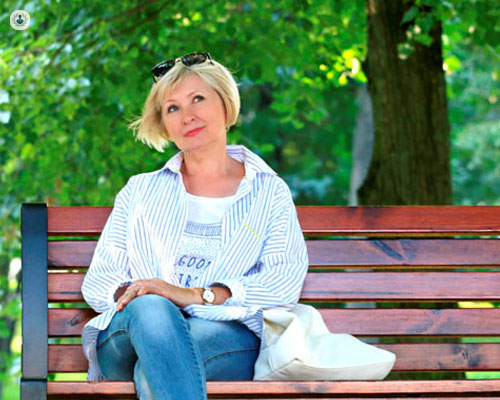What is menopause and when does it happen?
Written in association with:Menopause is a natural phase in a woman’s life that marks the end of her menstrual cycles. It typically occurs between the ages of 45 and 55, although some women experience it earlier or later. Menopause is diagnosed when a woman has gone without a period for 12 consecutive months, and it signals that the ovaries have stopped releasing eggs and producing the hormones oestrogen and progesterone. These hormonal changes can lead to various physical and emotional symptoms, which can affect everyday life.
Revered consultant obstetrician and gynaecologist Mrs Ritu Rana explains all you need to know.

What are the common symptoms of menopause?
The symptoms of menopause can vary greatly from one woman to another, but there are several common experiences. Hot flushes, for example, are one of the most frequently reported symptoms. These sudden feelings of intense heat are often accompanied by sweating and a reddening of the skin, especially around the face and neck. Many women also experience night sweats, which can disrupt sleep and lead to fatigue.
Other common symptoms include irregular periods before they stop entirely, mood swings, irritability, and even depression. Physical symptoms such as vaginal dryness and decreased libido (interest in sex) can also occur due to the drop in oestrogen levels. Some women might also experience joint pains, headaches, and memory lapses, making everyday tasks feel more challenging.
What is perimenopause and how is it different from menopause?
Perimenopause refers to the transitional period leading up to menopause, which can begin several years before your periods stop altogether. During this time, oestrogen levels begin to fluctuate, which can cause symptoms like irregular periods, hot flushes, and mood swings. Perimenopause typically occurs in women in their late 40s, but it can start earlier for some. Once menopause is reached, these symptoms usually start to subside as the body adjusts to lower hormone levels.
Can menopause affect mental health?
The hormonal changes that occur during menopause can have a significant impact on mental well-being. Many women experience mood swings, irritability, and anxiety, and some may feel depressed or overwhelmed by the physical changes happening in their bodies. These emotional shifts are often linked to changes in hormone levels, but they can also be triggered by other factors, such as sleep disturbances or changes in lifestyle. It is important to speak with a healthcare professional if mood changes are affecting daily life, as treatment options like therapy or medication can be helpful.
How can I manage the symptoms of menopause?
Managing the symptoms of menopause can involve a combination of lifestyle changes, over-the-counter remedies, and, in some cases, medical treatments. For example, staying active, maintaining a healthy diet, and practising relaxation techniques such as meditation can help manage symptoms like hot flushes and mood swings. If symptoms are severe, hormone replacement therapy (HRT) may be an option. HRT involves taking oestrogen and, in some cases, progesterone to replace the hormones that the body no longer produces. However, this treatment isn't suitable for everyone, and a healthcare professional can guide you on the best approach for your individual needs.
In addition to HRT, other options like vaginal moisturisers, anti-depressants, and cognitive behavioural therapy (CBT) can also help alleviate symptoms, depending on your experience and needs.
If you would like to book a consultation with Mrs Rana, do not hesitate to do so by visiting her Top Doctors profile today.


